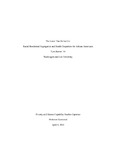The Lines That Define Us: Racial Residential Segregation and Health Disparities for African Americans

View/
Author
Barrett, Tyra A.
Subject
Washington and Lee University, Shepherd Poverty Program
Discrimination in housing
Race discrimination
Public health
Capabilities approach (Social sciences)
Theory of justice (Rawls, John)
Metadata
Show full item recordDescription
Capstone; [FULL-TEXT WILL BE AVAILABLE FOLLOWING A 5-YEAR EMBARGO] Tyra A. Barrett is a member of the Class of 2018 of Washington and Lee University. This capstone explored the mechanisms underlying the relationship between racial residential segregation and health disparities for African Americans. This relationship was examined through the analysis of how racial residential segregation began in America, how it is still perpetuated today, and how it is linked to health outcomes for African Americans. The implications of racial residential segregation in regards to health were examined within two ethical frameworks: the Capabilities Approach and the Rawlsian Theory on justice as fairness. This capstone ultimately came to the conclusion that not only is racial residential segregation a serious public health issue, but it is also a serious justice issue. This capstone conceptualized a theoretical framework to cultivate critical thinking on how to create future policy interventions to curtail racial residential segregation in the United States. Tyra Barrett